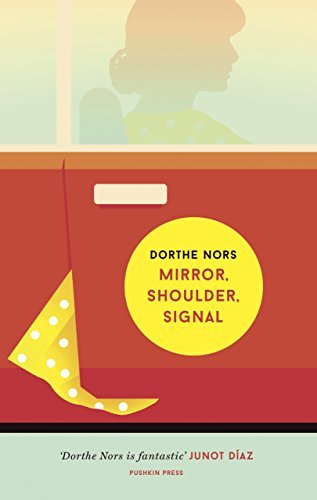When it rains so much, she can’t see the city, she’s gone astray in
Read it already? Try one of my other suggestions for Denmark!
The story of Mirror, Shoulder, Signal follows Sonja, a single woman in her 40s, grappling with learning to drive in Copenhagen, which is no easy task. She’s very self-conscious that she’s older than most of the people in her class. And her instructor Jytte smokes, frequently seizes control of the car and makes xenophobic/racist comments about other drivers and other students.
Sonja finally amps up the courage to switch instructors to the centre’s owner Folke. But that does not make it easier. Because Folke is a hugger, and Sonja just wants to learn how to drive.
It’s hard to find clothes to fit the body you have,
and it’s hard to find words to fit the people you love.
Sonja works as a translator of sensational Scandinavian crime fiction. But she is personally rather contemptuous of the people who read it, remarking that politicians who like taking these books on holiday will happily “rub themselves in SPF 50 and wallow in evil like it’s a party“.
The urban setting of Sonja’s wild car rides though Copenhagen contrasts sharply with her nostalgic and very detailed memories of her small-town roots in rural Jutland. She was the first person in her family to leave the small town world, and get a university degree in Copenhagen. Her sister stayed behind in the small town, and now she won’t pick up the phone. And Sonja writes her letters, but it is difficult to send them.

So, Sonja is here, nostalgic about her past, alienated from her family and unsure where to go. A fortune teller in a curry-coloured tunic once told her about her future, but Sonja can’t remember what she said. She also suffers from severe dizziness spells, and that is in fact a family illness, but Ellen, her rather excentric new-ageey masseuse, is convinced it is because of tensions stored in her connective tissues, and it will go away if Sonia learns to be assertive.
And in large parts of the book a thunderstorm is building, so Ellen might just be on to something. But Sonja is pragmatic and logical and doesn’t want to be interpreted. Or hugged. She really just wants to learn how to drive.
If you don’t believe in the occult, you can’t guard against it,
Sonja realizes. And if you do believe, you’re in deep shit.
I adored Ellen, and I could very vividly imagine her – like I could every single character of the book. They are bordering on caricatures, but on the other hand, I swear I have personally met every single one.
There is not really much of a plot to the book. It is made up of a series of snapshots from Sonia’s life, and that sounds like it should be boring. But it’s really not. Mirror, Shoulder, Signal is about the little things that feel huge to us personally — the way we sometimes overthink, get caught in memories, or worry over what might seem like small challenges to others.

The descriptions of the countryside and the closeness and constraints of small town life, and the tensions between rural and urban Denmark are captured beautifully. Sonia’s struggles with assertiveness and control, awkward friendships and the unspoken rules of social interactions in a reserved culture, where blending in and being unobtrusive is valued more that standing out, felt so very relatable.
Dorthe Nors writes in a winding, stream-of-consciousness style, that makes you constantly feel a bit of unease and tension, almost like you’re always a little off-balance or holding on for dear life. Just like Sonja, behind the wheel in a car in the streets of Copenhagen.
Within her there seems to be a rattling; from little stones, from stalks,
from days when it never quits. Inside her the sky empties itself in slow,
unresolving fashion, and there isn’t anything worth naming in the fridge.
I chose to start my literary journey around the world with this book because it has been on my TBR for a while. I actually thought to start with Babette’s feast, but I’m too much of a stickler for my own rules, to start with a book that does not fit them (Since Babette is set in Norway).
But Mirror, Shoulder, signal is very much set in Denmark. Parts of it felt so uniquely Danish to me that I suspect some of the nuances (ex. throw-away references to songs from Sonja’s childhood) will be completely lost, if you are not from Denmark. I read the book in Danish, but I almost want to read the English translation, just to see how they did that. If you have read Mirror, Shoulder, Signal or plan to do so, I would very much like to know what you think!
Join me on tuesday, when we move along to Sweden!
If this is not your thing, check out my list of other suggestions for Denmark!





My big gripe about this novel is the translation from Danish which I experienced both as a physical and an audio book. I’m well used to American-English spellings (I’m from the UK) but the overt US terminology and grammatical style throughout felt really inappropriate for what is a very European novel. This really interrupted my enjoyment of what otherwise is a well-written book.
As you mention, Rikke, this is not so much a traditional narrative but a series of wandering internal thoughts as Sonja struggles to negotiate life as an older single woman, surrounded by larger than life characters who don’t stop talking. There are many laugh-out-loud moments but ultimately I’m left wondering if any new life she creates will ever live up to her idealised recollections of a rural life that no longer exists. The ending when Sonja meets a fellow Jutland native equally lost in the big city was particularly poignant and left me feeling quite emotional!